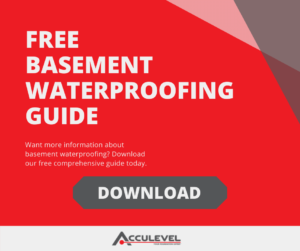When Do You Need a Waterproof Barrier for Your Basement?
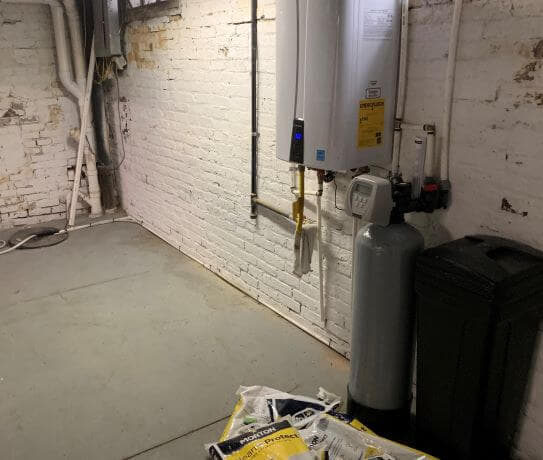
If you’ve been researching waterproofing for your basement, you’ve probably learned that it’s a misnomer. Waterproofing would be better described as water management. A water drainage system collects and reroutes water that gets into your basement- it doesn’t keep it out.
If you are currently dealing with a wet or leaking basement, and you want it clean and dry? You’re probably looking for encapsulation.
Acculevel has been repairing foundations and waterproofing houses since our start in 1996. So far, we’ve helped more than 35,000 homeowners restore strength, stability, and health to their homes. Our goal is to provide you with a whole-home solution; one that reflects your goals, restores your home’s value, and achieves full potential.
In this article, we’re going to explain what a waterproof barrier is, when you need one, and how to estimate the costs of installing this type of barrier in your home.
What is a Waterproof Barrier in a Basement?
A waterproof barrier is a type of liner that is installed around your basement walls. It doesn’t prevent water from seeping through the wall. Instead, it traps the water between the barrier and the wall, so the water funnels down to an installed water drainage system.
Waterproof barriers are not used on basement floors. This is for two reasons. To begin with, most of the water that intrudes into your basement comes in through the walls, not the floor. Additionally, while the barrier is puncture-resistant, it’s not designed to withstand regular foot traffic.
When Do You Need a Waterproof Barrier in Your Basement?
There are three major reasons you need a waterproof barrier: if you want to finish the basement, if the basement is built out of brick or stone, or if you are having health problems from compromised air quality.
What Are Your Long-Term Plans for Your Home?
Many people start out using their basement for storage space, or as a laundry room. But over time, expanding into the basement and “finishing” it becomes a goal. If you’re going to use some of your basement for a living area like a family room or home office, then installing a waterproof barrier first is a wise choice.
This barrier will prevent water and moisture from coming into contact with the insulation, drywall, carpeting, etc. That waterproof barrier will prevent biological growths of all kinds from growing, while also protecting your furnishings from damage. (If you are finishing your basement, you may also want to install an egress window.)
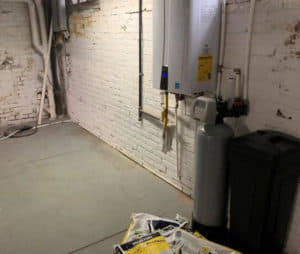
Before: this photo was taken by an Acculevel project advisor, during a free in-home assessment. The basement has a history of water seeping in through the brick walls.
What Is Your Basement Made Of?
Is your basement made of brick or stone, rather than concrete? If so, you should consider installing a waterproof barrier- no matter what your long term plans are.
This is because brick, stone, and the mortar that holds them together are softer materials that are more porous (when compared to concrete). Even with an excellent water drainage system, brick or stone basements are going to be humid- or outright damp.
Damp air is not healthy air- which leads to the third major reason you would install a waterproof barrier in your basement.
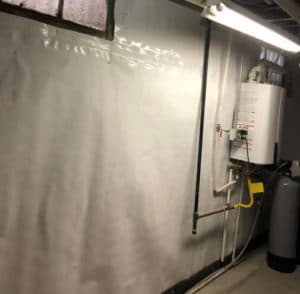
After: this photo was taken by an Acculevel crew member, after water drainage and encapsulation were installed.
How Healthy Is Your Basement?
A study by ASHRAE (American Society of Heating, Refrigerating and Air-Conditioning Engineers) demonstrated that 50% is an optimal level of humidity in a home. The chart below is from that report; you can see that all sorts of unpleasant biological organisms flourish in more extreme conditions.
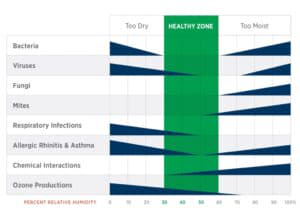
A 50% humidity level will provide the cleanest and healthiest air for your home.
If your basement is particularly humid, moisture can cause more than poor air quality. It can also produce an environment that can encourage growth of these unwanted organisms.
Mold, mildew, bacteria, viruses, and fungi can be irritating even to someone in perfect health. But if you or someone in your family has severe allergies, asthma, or other chronic respiratory illnesses, they can be seriously damaging. This is also true of the elderly or infants, who have weakened (or still developing) immune systems.
Moisture can also become a problem for the wooden components that exist within your basement, like the floor joists and beams that hold up your wooden flooring structure. Termites are particularly fond of damp wood, because it’s easy for them to chew up and tunnel through.
What is The Ideal Basement Barrier and Why?
At Acculevel, we install the best encapsulation material. It’s made of 100% virgin resin polyethylene and will not support mold or mildew growth. This is a woven and interlaced liner that is stronger and more puncture resistant than any other material currently available.
When installed correctly in conjunction with a water drainage system, our encapsulation is warrantied for 25 years. Want to know more about Acculevel warranties, and how we compare to other contractors? We’ve done that research for you.
Do You Have Questions About Keeping Your Basement Dry?
We have written a thorough and detailed homeowner’s guide to basement waterproofing. This is a free resource available to anyone who wants to learn more about water drainage, sump pumps, dehumidifiers, services and costs. Even if you do not live in our service area, please still bookmark and use this guide whenever you have questions.
Do you live in Indiana or the surrounding areas and need help with your basement? Please call Acculevel at 866-669-3349, or fill out our online form. We will schedule an appointment for you with one of our expert project advisors.
They will meet you at your home- on time (no vague appointment windows)- and discuss your issues and concerns. The project advisor will also need to know about your home’s history, and what your long-term goals are. Then, they will evaluate your entire home, to better diagnose the problems and determine the best solutions we have to offer.
As a team, you and your project advisor will discuss the results of the inspection and the necessary repair options. Our goal is to provide you a whole-home solution: we don’t want to only address the symptoms and ignore the underlying cause. This methodology won’t keep your home healthy and secure, and a short-term fix is not usually in your best interest!

